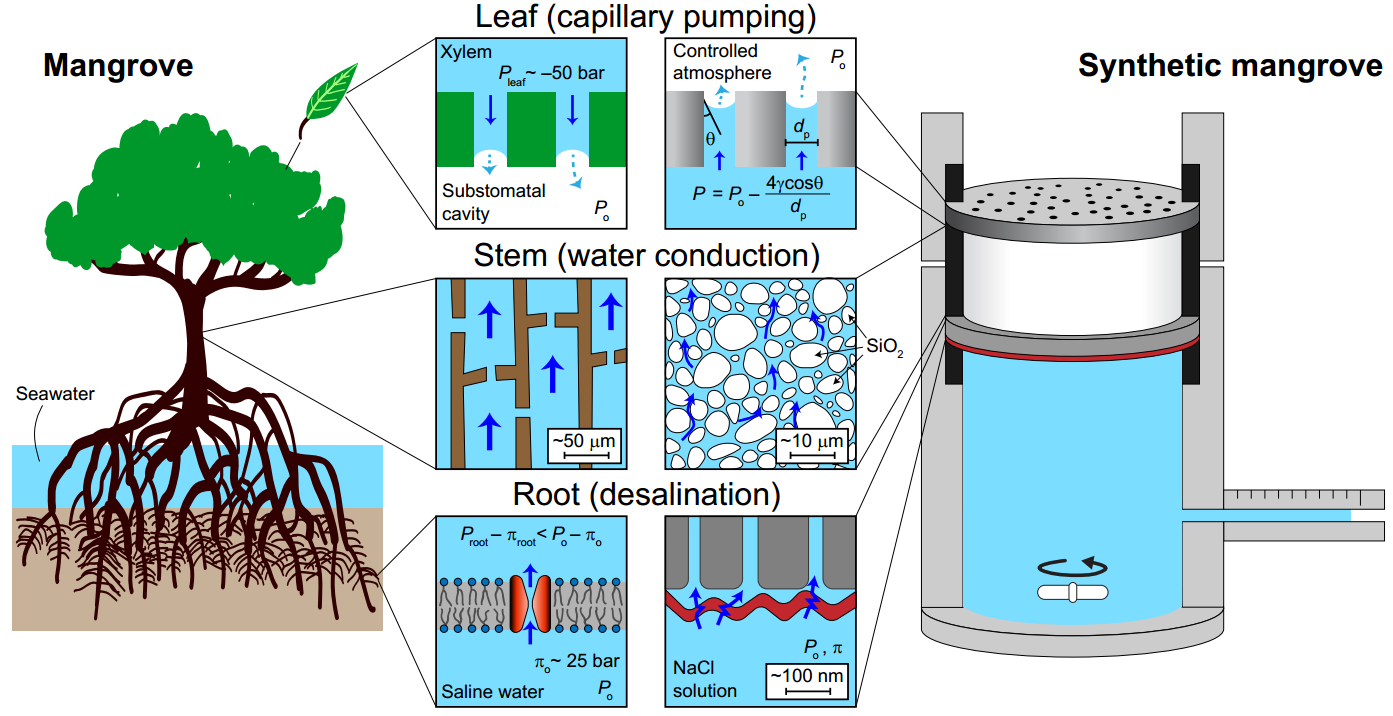Research Progress
Progress made in the study of bionic plant desalination mechanism by Associate Professor Wang Yunkun of Shandong University's School of Environment
发布时间: 2020-02-29 21:50 点击:3731
On 21 February, Science Advances published an online report entitled "Capily-driven lifelon in a" by Associate Professor Wang Yunkun of Shandong University's School of Environmental Science and Engineering with Yale University, the University of Minnesota and the University of British Columbia in Canada. synthetic mangrove" research paper. The paper reports on the process and mechanisms that drive desalination by the thin tension of bionic mangroves. Shandong University is the first completed unit of the thesis, and Associate Professor Wang Yunkun is the first author alone.
Mangroves are typical salt-plant groups growing in tropical and subtropical coastal intertidal zones, and are important vegetation types to maintain coastal ecological balance and biodiversity. Because of growing in coastal high-salt habitats, mangrove plants have evolved a salt-resistant adaptation mechanism that is different from terrestrial or freshwater aquatic plants. Botanists have done a lot of research on this issue, and the widely accepted theory is that mangrove plants produce negative pressure driven by leaf steaming, and steady water transmission from seawater is drawn from the water under the conditions of root rejection salt and stem substeady state. However, this theory has not yet been proven in engineering systems.
Based on this, Associate Professor Wang Yunkun and his collaborators explored the mechanism of salt water separation and water molecular transfer of mangrove plants by establishing a bionic experimental device (below): a porous polymer film filled with nanoporous alumina film or hydrogel filled as a leaf, a super-hydrophilic porous glass powder as a stem, and a polymer reverse osmosis membrane as a tree root. The experimental results show that the leaf surface can produce the super-high negative pressure induced by surface tension by steaming, and the fresh water is extracted from the super-high concentration of saline under the condition of near-total salt retention at the root. The negative pressure generated by the bionic leaf surface of the alumina film is exactly consistent with the theoretical value of the Calculation of the Young-Laplace equation, while the hydrogel bionic leaf surface can produce negative pressure of up to 338 bar, which is far more than the typical operating pressure of conventional reverse osmosis to 80 bar.

For the first time, the study simulates the desalination process driven by negative pressure of mangrove plants in engineering systems, which not only experimentally confirms the process of the molecular transmission and desalination mechanism of plant negative pressure under the theory of cohesion-theory, but also provides new possibilities for the passive separation process of engineering system. The paper was published and attracted a number of media attention, with The Guardian and Yale News, respectively, "Device inspired by mangroves can pick up up up water" and "Devi" Ce mimics mangroves the 's water-purifying power" features on this research, and actively reviews the significance and application value of this study.
source:https://www.view.sdu.edu.cn/info/1021/131143.htm
Related links to papers:Capillary-driven desalination in a synthetic mangrove
Address: C508 Dingxin Building, Jilin University, 2699 Qianjin Street, Changchun 130012, P. R. China
Copyright © 2024 International Society of Bionic Engineering All Rights Reserved
吉ICP备11002416号-1
Copyright © 2024 International Society of Bionic Engineering All Rights Reserved
吉ICP备11002416号-1









